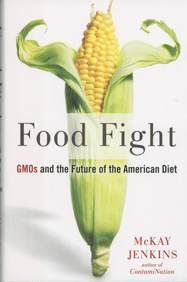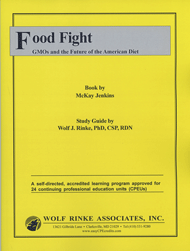|
Food Fight: GMOs and the Future of the American Diet
Book by McKay Jenkins
Study Guide by Wolf J. Rinke, PhD, CSP, RDN
Book, 322 pgs, and Study Guide with 1 Reporting Form, 21 pgs.
A comprehensive, balanced examination of the state of our food system, and a much-needed guide to enable you to help your clients make more informed choices about what to eat. Specifically you will be able to:
- Apply findings from research to help clients better understand the pros and cons of GMOs.
- Evaluate differences between organic, sustainable, biodynamic, and regenerative farming practices.
- Explain a groundbreaking method of crop breeding that may be able to help feed an ever increasing global population.
- Suggest strategies for selecting foods that have a positive impact on farming practices, the food system, and your client’s health.
- Plus much, much more.
For more information and customer comments, click
here.
Approved/Accepted by CDR
For RDs/RDNs & DTRs/NDTRs for the Professional Development
Portfolio
SUGGESTED Learning Need Codes:
2000, 2020, 2030, 2040, 2050, 4000, 4030, 4040, 4070, 5370, 8018, 8040, 8050, 9020, 9030
SUGGESTED Performance Indicators (PIs):
3.3.5, 6.1.5, 6.1.9, 6.2.5, 7.1.2, 7.2.1, 7.2.2, 7.2.3, 7.2.4, 7.2.6, 7.2.10, 8.1.2, 8.3.6, 8.4.1, 11.2.5, 11.2.7, 12.1.1, 12.1.3, 13.2.3
DON'T SEE your Performance Indicators or Code Listed here?
There are many Performance Indicators (PIs) that are applicable we can't list them all & Per CDR you may use ANY PI or CODE as long as it relates to your Learning Plan.
For details click here.
Share with a friend and Save! Click here for important information about
sharing.
To order an ADDITIONAL Reporting Form click below:
| C303F |
24 CPEUs |
REPORTING FORM |
|
|
Food Fight: GMOs and the Future of the American Diet
Book by McKay Jenkins
Study Guide by Wolf J. Rinke, PhD, CSP, RDN
©2017 Wolf Rinke Associates. No part of this
publication may be reproduced, stored in a retrieval system, or transmitted
in any form or by any means, electronic, mechanical, photocopying,
recording, scanning, or otherwise, without the prior written permission
of the Publisher.
CUSTOMER COMMENTS
Tanya Saad: "Up to date!!! Current! Exciting new information! Test questions were fair and a good representation of material covered in book!
Loved this course!"
Robyn Cain - "Well researched and the author did attempt to have a neutral position and report evidential facts."
Stephen B. Miller - "I enjoyed this book and course very much. Like a lot of people, I have my own opinion and was pleased with all the information."
Marie Bess Tojos - "As an RD I am able to explain better and answer questions from clients about GMO's pros and cons."
Glenda M. Folker - "Loved learning about a controversial issue. We all need to know about this topic!"
Susan Mathews Oliver - "I liked the scenarios that were used to test your knowledge."
Lila Davis Wrenn - "The course presented a whole, integrated discussion about the food system; pros & cons of GMOs were presented, as well as the factors affecting the system. Any RD working with the public and/or patients should take this course."
OVERVIEW AND INSTRUCTIONS
Welcome to the pre-approved, accredited CPE program for Food Fight: GMOs and the Future of the American Diet. The program consists of a book of the same title by McKay Jenkins and this study guide. This CPE program is designed to help you answer food safety questions from your clients and customers and to ensure that your facility serves safe foods. It is also designed to help you earn 24 Level 2, Continuing Professional Education Units (CPEUs).
To get the most out of this CPE program, it is suggested that you adhere to the following four steps:
- Review the objectives in this study guide.
- Read and study the book.
- Assess what you have learned by answering the self-assessment questions in this study guide.
- Compare your answers to the answer key, which you will find at the end of the study guide. If you scored at least 80% (40 questions) correct, you have completed the program and are ready to transfer your answers to the CONTINUING PROFESSIONAL EDUCATION REPORTING FORM in front of this study guide. If you scored less than 80% correct, re-read the appropriate sections of the book and until you score at least 80% (40 questions) correct.
After you have successfully completed the program, complete the CPE REPORTING FORM and:
Submit on-line at www.easyCPEcredits.com,
Or fax to: (410) 531-9282,
Or mail to: Wolf Rinke Associates, 721 Valley Forge Road #486, Valley Forge, PA 19481
We will email your Certificate of Completion.
When you submit your CPE Reporting Form to us via www.easyCPEcredits.com, fax, or mail, be sure to write your correct email address in the space provided on the CPE Reporting Form. If writing by hand, be sure to print your email address clearly.
To ensure that our emails are delivered to your inbox (instead of your junk/spam folders), please add cpesupport@wolfrinke.com to your Address Book or Safe List of allowed email senders. Also, be sure to allow attachments from this email address.
LEARNING OBJECTIVES
Upon completion of this CPE program you will be better able to:
- Help clients make informed food buying decisions.
- Explain genetics, genetic engineering (GE), genetic modifications (GM) and genetic modified organisms (GMOs).
- Explain the history of GM foods.
- Recognize the prevalence of GM foods.
- Explain which foods are typically GMO foods and which are GMO free.
- Identify the GE plants that have currently been approved for agricultural use.
- Explain how GMOs and agricultural chemicals are developed, tested and controlled, who is responsible for each, and where in the U.S. it is done.
- Recognize the role EPA and other regulatory agencies play in “keeping us safe.”
- Apply findings from research to help clients better understand the pros and cons of GMOs.
- Provide clients with a balanced answer to the question: Are GMOs safe?
- Communicate potential risk and benefits of GMOs and the chemicals that often accompany them.
- Recognize the most widely used agricultural chemicals and their effects on your client’s health.
- Debunk the claim that GMOs have reduced the total load of chemicals sprayed on crops.
- Explain to clients that “are GMOs safe?” may not be the correct question to ask.
- Help clients achieve clarity about whether or not GMOs are helping to “feed the world.”
- Help clients better understand labeling laws in the U.S. and the rest of the world.
- Recognize how Americans spend their food dollars.
- Apply findings from current genome research.
- Assess the challenges and the potential solutions associated with the industrial food system.
- Identify the most widely crops planted in the U.S. and the challenges associated with planting monoculture crops.
- Evaluate the challenges associated with relying primarily on annual crops.
- Explain how “politics” impacts the food supply and its consumption.
- Evaluate the impact the “green revolution” has had on the global food supply.
- Debunk the claim that ethanol is a “green” substitute for petroleum.
- Assess the costs and benefits associated with practicing integrated pest management farming practices.
- Explain sustainable practices to restore the health of depleted soil.
- Evaluate differences between organic, sustainable, biodynamic, and regenerative farming practices.
- Evaluate the costs and benefits of purchasing foods from Community Supported Agriculture (CSA) farms.
- Explain a groundbreaking method of crop breeding that may be able to help feed an ever increasing global population.
- Suggest strategies for selecting foods that have a positive impact on farming practices, the food system, and your client’s health.
TABLE OF CONTENTS
PROLOGUE: Square Tomatoes
Part One: ROOTS
1. Are GMOs Safe? Is That the Right Question?
2. The Long, Paved Road to Industrial Food,
and the Disappearance of the American Farmer
3. Mapping and Engineering and Playing Prometheus
Part Two: SEEDS
4. The Fruit That Saved an Island
5. Trouble in Paradise
6. Fighting for That Which Feeds Us
Part Three: FRUIT
7. Feeding the World
8. The Plant That Started Civilization, and the Plant That Could Save It
9. Can GMOs Be Sustainable?
10. The Farm Next Door
EPILOGUE: Getting Our Hands Dirty
ACKNOWLEDGMENTS
NOTES
INDEX
ABOUT THE AUTHOR OF THE STUDY GUIDE
Wolf J. Rinke, PhD, RDN, CSP is the president and founder of Wolf Rinke Associates, a company that has provided high quality CPE programs to nutrition professionals since 1990.
He earned a BS at Drexel University, a MS at Iowa State University, a PhD in Continuing and Vocational Education (Adult Ed) at the University of Wisconsin, and interned at Walter Reed Army Medical Center. He participated in a test item writer workshop sponsored by the Commission on Dietetic Registration (CDR).
Wolf is a past Adjunct Associate Professor, Graduate School of Management & Technology, University of Maryland, and a former Adjunct Faculty Member, School of Continuing Studies, The Johns Hopkins University.
He is the past president of the DC Dietetic Association and has been honored by the Academy with the Award for Excellence in the practice of Management; the Outstanding Dietitian of the Year Award; the Outstanding Service Award; and has delivered the Lenna Frances Cooper Lecture.
At the Academy he has served in numerous leadership roles including Chair, Scholarship Committee, DBC; Chair, Communication Committee, CDR; Chair, Area Coordinating Committee, COE; Chair, COE, and member of Resource for Education Programs Committee; Honors Committee; CDR, Licensure Panel and Ethical Practices Task Force; CDR; House of Delegates and Board of Directors.
He is the author of more than 500 articles, numerous CPE home-study programs, several popular books, and the free monthly eNewsletter Read and Grow Rich written specifically for savvy Nutrition Professionals like YOU!
Subscribe now at www.easyCPEcredits.com--you’ll be glad you did!
ACKNOWLEDGEMENTS
Special thanks to the following individuals for their careful review of this CPE program.
Marylou Anderson, MS, RDN, CD, CDE
Inpatient Dietitian Diabetes Educator
St. Joseph Medical Center
Tacoma, WA
Kimberly A. Feeney, MS, RD, CSSD
Gatorade/CPSDA Sports Nutrition Immersion Program Fellow
Arizona State University
Tempe, Arizona
Kristen Finn, DCN, RD
Senior Clinical Sciences Specialist
Nestle Nutrition
Florham Park, NJ
If you prefer to order by phone, mail
or fax click below
or click here to contact us with
other questions.
For information about our other products and
services return to the sidebar at the top of the page.
|
|
|


